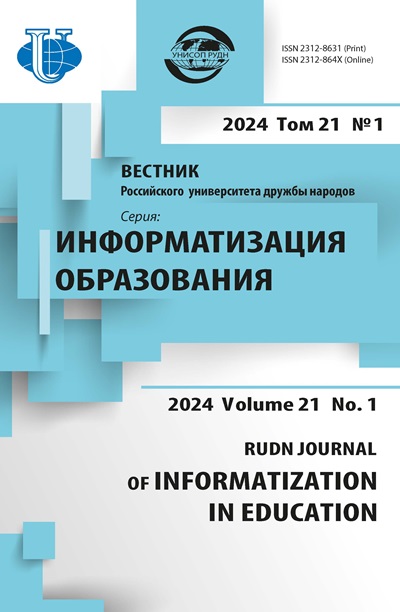Issue
Title
Authors
|
Vaganova V.I., Kuchumova O.P. |
|
Shunina L.A., Grinshkun A.V. |
|
Komelina E.V. |
|
Lotova E.Y. |
|
Zotova A.S. |
|
Zenkina S.V., Gerasimova E.K., Fedoseeva M.V. |
|
Aslanov R.E., Bolshakov A.A., Grinshkun A.V. |
|
Nikulina E.G., Starkova E.K., Ryabchikova V.G., Sergeeva N.A. |
|
Gribkov D.N., Dengina M.R., Matveev V.V., Masharova T.V. |
|
Ascheulova A.V., Gribkov D.N., Mamaeva E.A., Nimatulaev M.M. |
|
Aslanov R.E., Shunina L.A., Grinshkun A.V., Bolshakov A.A. |
|
Zenkina S.V., Pankratova O.P. |
|
Suvirova A.Y., Lesin S.M., Sheveleva N.N., Antonov N.V. |
|
Dreytser S.I. |
|
Khochenkova T.E. |
|
Semenova D.A. |
|
Rizakhojayeva G.A., Akeshova M.M. |
|
Shamkut V.L. |
|
Usmanov S.A. |
|
Vasilenko A.V. |
|
Sadykova A.R., Levchenko I.V., Kartashova L.I. |
|
Tsarapkina J.M. |
|
Bostanov R.A., Gerbekov H.A., Halkecheva I.T. |
|
Beloglazov A.A., Beloglazova L.B., Beloglazova I.A., Trubacheev E.V., Maltsev O.L., Kletskin A.A., Pechersky D.K., Blokhin M.R. |
|
Kartashova L.I., Levchenko I.V. |
|
Zaslavskaya O.Y. |
|
Fakova M.O. |
|
Fedotov A.V., Polushkina E.A. |
|
Kornilov V.S., Morozova S.V. |
|
Beloglazov A.A., Beloglazova L.B., Beloglazova I.A. |
|
Beloglazov A.A., Beloglazova L.B., Bondareva O.B., Ismailova H.E. |
|
Pykhtina N.A. |
|
Degtyareva L.V., Semenyachenko Y.A. |
|
Detushev I.V., Dobritsa V.P. |
|
Lavonen Jari -. |
|
Bazhenovа S.A. |
|
Kudinov V.A., Grigoriev S.G. |
|
Grigoryeva K.S., Salekhova L.L. |
|
Trofimets E.N. |
|
Aslanov R.M., Ignatova O.G., Nizhnikov A.I. |
|
Kornilov V.S. |
|
Andreev A.V., Usova N.A. |
|
Levchenko I.V. |
|
Grinshkun V.V., Shirochenko M.J. |
|
Duiseyeva G.O., Berkimbaev K.M. |
|
Grigorieva M.A. |
|
Grinshkun V.V., Dimov E.D. |
|
Berkimbaev K.M., Akeshova M.M. |
|
Bogun V.V. |
|
Kozlovskih L.A. |
|
Rovkov M.N. |
|
Bidaybekov E.Y., Kulbekov M.K., Ospanbekov E.A., Erzhenbek B., Hamraev S.I. |
|
Bocharov M.I. |
|
Polyanskaya A.V. |
|
Polushkina A.O. |
|
Krasnova G.A., Polushkina A.O. |
|
Galchuk L.M. |
|
Yaroshevich V.I., Safuanova A.M., Safuanov I.S. |
|
Krasnova G.A., Grinshkun V.V. |
|
Krasnova G.A., Grinshkun V.V., Pykhtina N.A. |
|
Baranova N.M. |
|
Bidaybekov E.Y., Kornilov V.S., Kamalova G.B., Akimzhan N.S. |
|
Detushev I.V. |
|
Kurnosenko M.V. |
|
Khozyainova M.S. |
|
Grigoriev S.G., Grinshkun V.V. |
|
Zhuzhzhalov V.E., Baranova O.A. |
|
Mikhailova E.B. |
|
Pavlova A.E. |
|
Denisova A.B. |
|
Lopatin E.A., Shkabin G.S. |
|
Tomin V.I. |
|
Lvova O.V. |
|
Denishceva L.O., Krasnyanskaya K.A. |
|
Shirochenko M.J. |
|
Kartashova L.I., Levchenko I.V., Pavlova A.E. |
|
Beloglazova L.B., Beloglazov A.A. |
|
Abdurazakov M.M., Inina L.A. |
|
Butova V.N. |
|
Istomin I.P. |
|
Yuzhakov A.A. |
|
Popova I.N. |
|
Mihajlishina G.F., Bahtina E.J. |
|
Rozanova S.A., Sanina E.I., Kuznetsova T.A. |
|
Aldiyarov K.T., Bidaybekov E.Y. |
|
Osipovskaya E.A., Pshenichny N.G., Kharakhordina M.V. |
|
Kornilov V.S. |
|
Kornilov V.S. |
|
Ivanov A.V. |
|
Kuklin V.Z., Vinogradov V.A. |
|
Grinshkun V.V., Krasnova G.A. |
|
Grigoriev S.G., Esayan A.R. |
|
Senashenko D.V., Senashenko M.A. |
|
Koloshein A.P. |
|
Vodopyan G.M. |
|
Berdi D.K., Saribaeva A.X., Zhilisbaeva G.N., Berkimbaev K.M., Kornilov V.S. |
|
Usembaeva I.B., Kornilov V.S., Berkimbaev K.M., Sarybaeva A.H. |
|
Makulbek A.B., Ernazarova D.Z. |
|
Berkimbaev K.M., Kerimbaeva B.T., Meyrbekova G.P. |
|
Berkimbayev K.M., Mukhamedzhanov B.K., Akeshova M.M. |












